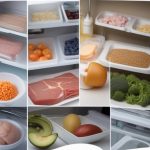Urological health often requires mindful attention to diet, as certain foods can exacerbate symptoms related to conditions like interstitial cystitis, overactive bladder, kidney stones, or prostate issues. Many individuals find that modifying their dietary habits significantly improves their comfort and quality of life. This isn’t about restrictive dieting; it’s about making informed choices that support a healthy urinary tract and overall well-being. A thoughtfully constructed weekly meal plan can be incredibly powerful in managing these concerns, providing both nutritional benefits and peace of mind.
The goal is not deprivation but balance. We aim to minimize irritants while maximizing hydration and essential nutrients. This means prioritizing whole foods – fruits, vegetables, lean proteins, and whole grains – and reducing intake of common triggers like caffeine, alcohol, spicy foods, artificial sweeteners, and acidic beverages. It’s also vital to understand that individual sensitivities vary greatly; what bothers one person may not affect another. Keeping a food diary can be an invaluable tool in identifying personal trigger foods. This article provides a framework for building a urology-friendly weekly meal plan, offering practical tips and ideas to get you started on the path towards better bladder and kidney health.
Understanding Dietary Triggers & Supportive Foods
Many common dietary components are known to potentially irritate the urinary tract or contribute to conditions affecting it. Caffeine, found in coffee, tea, and some sodas, is a well-known diuretic (increasing urine production) and can also be a bladder irritant for some. Similarly, alcohol has diuretic effects and may worsen symptoms of overactive bladder. Spicy foods contain compounds like capsaicin that can irritate the bladder lining. Artificial sweeteners, particularly those found in diet drinks and sugar-free products, are often implicated as bladder triggers due to their chemical composition. Acidic foods and beverages – citrus fruits, tomatoes, carbonated drinks – can also contribute to discomfort for individuals with sensitive bladders or interstitial cystitis.
However, it’s not all about what to avoid! There’s a wealth of supportive foods that promote urological health. Water is paramount; adequate hydration helps dilute urine and flush out potential irritants. Foods rich in antioxidants – berries, leafy greens, colorful vegetables – can protect against cellular damage. Potassium-rich foods like bananas, sweet potatoes, and spinach may help regulate bladder function. Fiber supports digestive regularity, which indirectly impacts overall health including urological well-being. Lean proteins provide essential building blocks for tissue repair without placing excessive strain on the kidneys.
Focusing on a predominantly whole-food diet is the cornerstone of urology-friendly eating. It’s about minimizing processed foods, refined sugars, and unnecessary additives that can contribute to inflammation and irritation. This doesn’t mean eliminating all “fun” foods entirely – it simply means being mindful of portion sizes and frequency. A balanced approach allows for occasional treats without derailing your overall dietary goals.
Building a Sample Weekly Meal Plan
Creating a structured meal plan takes the guesswork out of daily eating and ensures you’re consistently making choices that support your urological health. This is just a sample, designed to be customized based on individual preferences and tolerances. Remember to always consult with your healthcare provider or a registered dietitian for personalized dietary recommendations. The following plan emphasizes hydration, lean proteins, whole grains, and bladder-friendly fruits & vegetables.
Monday: Breakfast – Oatmeal with blueberries and a sprinkle of cinnamon; Lunch – Grilled chicken salad with mixed greens and a light vinaigrette dressing; Dinner – Baked salmon with roasted sweet potatoes and steamed broccoli. Tuesday: Breakfast – Scrambled eggs with spinach; Lunch – Turkey breast sandwich on whole-wheat bread with lettuce and avocado; Dinner – Lentil soup with a side of quinoa. Wednesday: Breakfast – Greek yogurt with sliced peaches and a drizzle of honey; Lunch – Leftover lentil soup; Dinner – Chicken stir-fry with brown rice and a variety of non-citrus vegetables (carrots, bell peppers, snap peas). Thursday – Saturday continue this pattern, varying protein sources (lean beef, tofu, fish) and vegetable choices. Sunday: A more relaxed day allowing for slightly larger portions or a treat meal, while still adhering to general urology-friendly principles.
Hydration is key throughout the week – aim for at least 8 glasses of water daily. Snacking can be incorporated with options like sliced cucumbers, carrots sticks with hummus, or small handfuls of almonds. Prioritizing home-cooked meals over processed foods gives you greater control over ingredients and allows you to avoid potential irritants. Meal prepping on the weekend can save time and ensure you have healthy options readily available during busy weekdays.
Hydration Strategies
Staying adequately hydrated is arguably the most important aspect of a urology-friendly diet. Water helps dilute urine, reducing irritation and flushing out waste products. But simply drinking 8 glasses of water isn’t always enough – it’s about how you hydrate throughout the day. Spread your fluid intake evenly rather than gulping large amounts at once. This avoids overwhelming the bladder.
- Carry a reusable water bottle with you as a constant reminder to sip regularly.
- Set reminders on your phone or use hydration tracking apps to stay on schedule.
- Incorporate hydrating foods into your diet, such as watermelon, cucumbers, and celery.
- Limit caffeinated and alcoholic beverages, which can have diuretic effects.
Herbal teas (non-citrus) can be a pleasant alternative to water but check with your doctor if you have kidney concerns. Avoid sugary drinks altogether, as they provide empty calories and can contribute to inflammation. Focus on making hydration a habit rather than a chore. If you struggle with consistent intake, consider exploring fluid patterns for each meal.
Identifying & Managing Personal Triggers
Everyone is different; what triggers symptoms for one person may not affect another. Keeping a detailed food diary is crucial for identifying your personal sensitivities. Record everything you eat and drink, along with any associated symptoms (frequency of urination, urgency, pain, discomfort). This will help pinpoint potential trigger foods or beverages.
- Be meticulous in your recording – even seemingly insignificant items can play a role.
- Track both food and fluid intake.
- Note the timing between consumption and symptom onset.
- Eliminate suspected triggers one at a time to assess their impact.
Once you’ve identified potential triggers, experiment with eliminating them from your diet for a period of time (e.g., two weeks) to see if symptoms improve. Then gradually reintroduce them in small amounts to determine your tolerance level. This process may require patience and self-observation but is essential for creating a truly personalized dietary plan.
Adapting the Plan for Specific Conditions
Different urological conditions may necessitate slightly different dietary modifications. For instance, individuals with kidney stones often benefit from limiting oxalate-rich foods (spinach, rhubarb, nuts) and increasing fluid intake to promote urine flow. Those with prostate issues may find that reducing dairy intake can be helpful, as it’s believed to potentially contribute to inflammation.
For people with interstitial cystitis, a more restrictive approach is often necessary, involving the elimination of common bladder irritants like caffeine, alcohol, acidic foods, and artificial sweeteners. A trial-and-error process under the guidance of a healthcare professional is usually required to identify individual sensitivities. This emphasizes the importance of individualized dietary plans tailored to specific needs. Don’t attempt to self-diagnose or drastically alter your diet without consulting with a qualified medical professional. Remember that dietary changes are just one component of a comprehensive treatment plan, which may also include medication and other therapies.
For those looking for more structured guidance, building a weekly meal plan can significantly streamline the process. Furthermore, understanding how to create bladder-safe plans is critical for managing IC symptoms. If kidney health is your primary concern, you might also explore weekly meal plans specifically designed for the kidneys. To help streamline preparation, consider utilizing pre-made urology-friendly meals when time is short. Finally, remember that a sustainable lifestyle involves more than just diet – explore ways to build a long-term anti-inflammatory plan for holistic wellness.





















